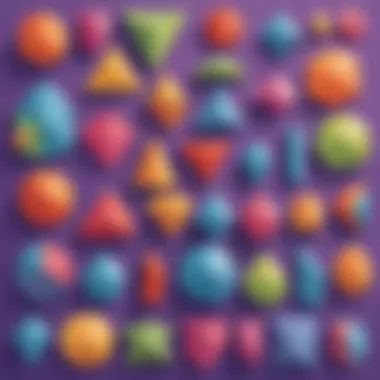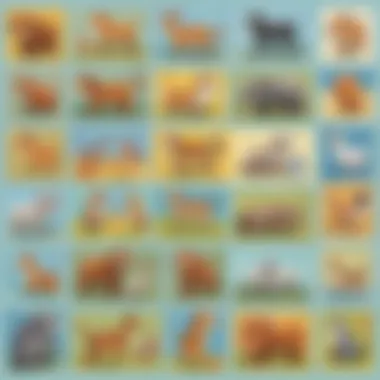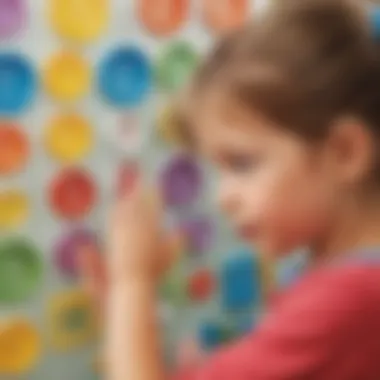Engage Your Preschooler with Exciting Math Counting Activities


Fun Activities Ideas
In the realm of preschool mathematics, securing a strong foundation from an early age sets the stage for a lifelong love of numbers and problem-solving. Introducing interactive counting activities in a fun and engaging manner can be the catalyst for sparking young learners' curiosity and enthusiasm. From indoor activities that promote hands-on learning to outdoor adventures that stimulate exploration, a holistic approach to math education can be achieved. Incorporating arts and crafts activities not only enhances fine motor skills but also encourages creativity and critical thinking in preschoolers. Further, engaging in science experiments tailored for young minds can cultivate a deep-seated interest in understanding the world around them. Lastly, involving children in simple cooking and baking activities not only reinforces counting skills but also introduces practical applications of math in daily life.
Indoor Activities
Indoor activities provide a conducive environment for preschoolers to delve into the fascinating world of numbers while staying sheltered from any external distractions. From using everyday objects for counting exercises to creating DIY math games, there are numerous ways to make learning math an enjoyable indoor experience. Utilizing colorful manipulatives like counting beads or blocks can help enhance visual and tactile learning, making abstract mathematical concepts more tangible for young learners.
Outdoor Adventures
Venturing outdoors opens up a realm of possibilities for integrating math into nature exploration and physical play. From counting the steps while walking in the park to identifying geometric shapes in the environment, outdoor adventures offer a dynamic setting for hands-on learning. Outdoor math scavenger hunts can transform a simple walk into an exciting learning opportunity, with children actively engaging in counting and pattern recognition while exploring the outdoors.
Arts and Crafts
The intersection of math and creativity can be seamlessly explored through arts and crafts activities tailored for preschoolers. Incorporating counting elements into art projects not only adds a mathematical dimension but also fosters imaginative thinking. From creating numbered collages to using shapes in craft activities, blending math with artistic expression empowers young learners to view numbers in a new and innovative light.
Science Experiments
Science experiments tailored for preschoolers serve as a gateway to exploring mathematical principles in a hands-on and engaging manner. Activities such as measuring ingredients for simple experiments, observing patterns in nature, and conducting basic geometry experiments can instill a sense of wonder and curiosity about the interconnectedness of math and science.
Cooking and Baking
Cooking and baking present practical opportunities for preschoolers to apply their counting skills in real-life contexts. Engaging children in measuring ingredients, counting utensils, and following simple recipes not only reinforces numerical concepts but also nurtures independence and confidence in the kitchen. The multisensory experience of cooking and baking can enhance mathematical understanding while fostering a love for culinary arts in young learners.
Introduction to Preschool Math Counting Activities
Preschool math counting activities are essential in laying a robust foundation for young learners in the world of numbers. These activities play a fundamental role in shaping children's cognitive development by introducing them to basic mathematical concepts in a fun and engaging manner. By incorporating various counting activities into early education, educators and parents can nurture a child's numerical literacy and problem-solving skills from a tender age. Exploring preschool math counting activities is not just about learning to count; it's about fostering critical thinking, promoting creativity, and instilling a lifelong love for mathematics.
Importance of Early Math Skills Development


Building a Strong Foundation: The essence of building a strong mathematical foundation lies in creating a sturdy base for future learning. It involves introducing children to basic numeracy concepts, such as counting, recognizing patterns, and understanding quantities. By establishing a solid groundwork in mathematics, young learners can navigate more complex mathematical challenges with confidence.
Enhancing Logical Thinking: Logical thinking is a pivotal aspect of early math skills development as it aids in problem-solving and decision-making. By engaging in math counting activities that require logical reasoning, children can enhance their analytical skills and develop a structured approach to mathematical challenges.
Promoting Number Recognition: Promoting number recognition is crucial in helping children identify and understand numerical symbols. By incorporating activities that focus on number recognition, such as counting objects or arranging numbers in sequence, young learners can develop a strong numerical foundation and boost their overall math proficiency.
Goals of Counting Activities
Developing Numeracy Skills: Counting activities are instrumental in developing numeracy skills by teaching children to understand the relationship between numbers and quantities. Through hands-on counting tasks, children can enhance their ability to quantify objects, solve basic arithmetic problems, and apply mathematical concepts in real-life scenarios.
Improving Fine Motor Skills: Counting activities also contribute to improving fine motor skills in young learners by engaging them in tasks that require precision and coordination. Activities like sorting objects, placing items in sequence, or building with blocks help children refine their motor skills while enhancing their spatial awareness and hand-eye coordination.
Encouraging Problem-Solving: Counting activities instill problem-solving skills by presenting children with mathematical challenges that require critical thinking and logical reasoning to solve. By engaging in activities like puzzles, number sequences, or math games, children develop a strategic approach to problem-solving and enhance their capacity to tackle mathematical problems with confidence.
Hands-On Counting Activities:
Hands-on counting activities play a crucial role in engaging young learners and fostering a love for numbers in preschool math education. By involving tactile experiences and interactive learning, these activities enhance children's understanding of mathematical concepts in a practical and immersive way. With a focus on sensory stimulation and hands-on exploration, preschoolers can develop a strong foundation in numeracy skills that will set a solid trajectory for their future mathematical aptitude. While incorporating hands-on counting activities, consider the importance of providing a multisensory learning experience to cater to diverse learning styles and enhance retention.
Counting with Objects:
When it comes to counting with objects, using everyday items serves as a fundamental approach to building numerical skills among young learners. By utilizing familiar objects such as toys, snacks, or household items, children can connect mathematical concepts to their daily experiences, making learning more relatable and engaging. The key characteristic of using everyday items lies in its practicality and accessibility, allowing educators to facilitate hands-on learning experiences without the need for specialized materials. This approach not only reinforces number recognition but also cultivates analytical thinking and cognitive development through real-world applications.
Using Everyday Items:
Using everyday items for counting activities offers practicality and versatility to educators seeking to create interactive learning environments for preschoolers. The advantage of this approach lies in its ability to seamlessly integrate mathematical concepts into children's surroundings, promoting continuous learning beyond the classroom. However, it is essential to ensure the safety and appropriateness of the selected items to maintain a conducive learning environment suitable for young learners.
Sorting and Grouping:
Sorting and grouping objects during counting activities provide young learners with opportunities to categorize and classify items based on distinct attributes such as shape, color, or size. This practice not only enhances numerical literacy but also strengthens critical thinking and organizational skills among preschoolers. The unique feature of sorting and grouping lies in its ability to promote visual discrimination and decision-making while facilitating collaborative learning experiences in group settings.


Number Line Exploration:
Introducing preschoolers to number line exploration can significantly contribute to their understanding of numerical sequences and patterns. By visually representing numbers in a sequential format, children can grasp the concept of number progression and develop essential skills for mathematical operations. The key characteristic of number line exploration lies in its ability to reinforce number recognition and spatial reasoning, allowing young learners to visualize numerical relationships in a concrete way.
Introducing Number Sequences:
Introducing number sequences through number line exploration aids in establishing a logical progression of numbers for young learners. This approach facilitates a systematic understanding of numerical order and promotes numerical fluency by encouraging children to identify and continue number patterns. The advantage of this method lies in its capacity to scaffold learning outcomes by providing a visual reference point for numerical relationships and numerical operations.
Hopscotch Counting:
Hopscotch counting offers a dynamic and kinesthetic approach to counting activities, combining physical movement with mathematical learning. By incorporating number sequences into a playful and energetic activity, children can engage in active learning while reinforcing their understanding of numerical progression. The unique feature of hopscotch counting lies in its ability to promote physical coordination, spatial awareness, and cognitive development through experiential learning.
Counting Blocks and Manipulatives:
Utilizing counting blocks and manipulatives in preschool math activities fosters creativity and problem-solving skills amongst young learners. By manipulating tangible objects to represent numerical concepts, children can develop spatial awareness and geometric reasoning in addition to numerical literacy. The key characteristic of counting blocks and manipulatives lies in their versatility and adaptability, allowing educators to design engaging activities that cater to diverse learning styles and abilities.
Building Towers:
Building towers using counting blocks encourages children to explore patterns, symmetry, and spatial relationships while engaging in hands-on construction activities. This approach not only enhances fine motor skills but also cultivates patience, perseverance, and critical thinking as children experiment with building techniques and geometric forms. The advantage of this activity lies in its open-ended nature, promoting creativity, teamwork, and a growth mindset among young learners.
Pattern Recognition:
Engaging in pattern recognition activities with manipulatives empowers preschoolers to identify, create, and extend patterns using various shapes, colors, and sizes. This practice enhances problem-solving abilities, visual discernment, and cognitive flexibility while fostering a deeper understanding of mathematical concepts such as sequences and symmetry. The unique feature of pattern recognition lies in its capacity to stimulate creative thinking, logical reasoning, and observational skills, providing a holistic approach to mathematical exploration and discovery.
Interactive Math Games
Interactive math games play a crucial role in engaging young learners and making math enjoyable and accessible for preschoolers. These games help in developing key numeracy skills, promoting problem-solving abilities, and enhancing critical thinking at an early age. By actively involving children in interactive math games, educators can create a dynamic learning environment that fosters a love for numbers and mathematical concepts.
Digital Counting Games


Digital counting games, such as online number recognition activities, offer a modern and engaging way to introduce preschoolers to basic math concepts. Online number recognition is a specific aspect of digital counting games that focuses on helping children identify and associate numbers with visual representations. This method aids in improving number awareness and cognitive skills in young learners. The interactive nature of online number recognition games provides immediate feedback and reinforcement, making learning fun and effective.
Interactive Puzzles
Interactive puzzles are another component of digital counting games that contribute to the overall goal of the article. These puzzles encourage children to problem-solve, think logically, and critically analyze numerical patterns. The key characteristic of interactive puzzles is their ability to stimulate children's minds while offering an entertaining and educational experience. Puzzles help in developing spatial reasoning, cognitive flexibility, and attention to detail, making them a popular choice for enhancing math skills in preschoolers. While interactive puzzles can boost critical thinking, they also promote creativity and persistence in young learners.
Counting Bingo
In the realm of interactive math games, Counting Bingo stands out as a creative and effective way to reinforce numeracy skills in preschoolers. The aspect of 'Fun with Numbers' in Counting Bingo serves as a compelling method to engage children in counting activities in a playful and interactive manner. This component captures the attention of young learners by associating math with excitement and enjoyment, transforming the learning process into a stimulating experience. 'Fun with Numbers' in Counting Bingo not only reinforces counting skills but also enhances concentration, memory retention, and cognitive abilities in children.
Colorful Counting Cards
Another engaging aspect of Counting Bingo is the use of Colorful Counting Cards, which further enriches the learning experience for preschoolers. These cards are designed to be visually appealing and captivating, making learning math a visually stimulating experience for young children. The key characteristic of Colorful Counting Cards lies in their ability to enhance number recognition, promote vocabulary development, and encourage social interaction among children. The unique feature of Colorful Counting Cards is their multisensory approach, which appeals to different learning styles and ensures comprehensive understanding. While Colorful Counting Cards are advantageous in reinforcing math concepts, they also provide a hands-on and interactive method for children to explore numbers and improve cognitive skills.
Creative Math Projects
In the realm of early childhood education, the significance of hands-on projects cannot be underestimated, particularly when it comes to laying a solid foundation in math concepts. Creative Math Projects serve as vital tools in engaging preschoolers and nurturing their cognitive development. By incorporating art and creativity into mathematical learning, these projects offer a multidimensional approach to enhancing numerical skills.
DIY Number Crafts
Number Collages
The concept of Number Collages involves creating artistic compositions using various numbers. This activity not only fosters creativity but also reinforces numerical recognition. The tactile experience of arranging numbers visually provides a hands-on method for children to interact with numerical concepts. Number Collages are an impactful choice for this article due to their versatility in catering to diverse learning styles. Its unique feature lies in its ability to combine artistic expression with numeracy, making it an engaging and effective learning tool for preschoolers.
Counting Caterpillars
Counting Caterpillars present a captivating avenue for preschoolers to practice counting skills through a fun and interactive approach. By threading multiple counting beads onto a string to resemble a colorful caterpillar, children engage in a tactile counting experience that reinforces numerical sequencing. This activity is a popular choice for promoting fine motor skills while enhancing number sense. The unique feature of Counting Caterpillars is its blend of hands-on creativity with mathematical concepts, offering a holistic learning experience for young learners.
Math Storytelling
Story Sequencing
Story Sequencing involves organizing narrative events in chronological order, fostering logical thinking and sequencing skills in preschoolers. This activity not only stimulates imagination but also enhances comprehension and memory retention. The visual aspect of arranging story elements aids in developing cognitive abilities and linguistic skills. Story Sequencing is a beneficial choice for this article as it encourages narrative comprehension alongside numerical understanding. Its unique feature lies in its ability to link storytelling with mathematical concepts, creating an immersive learning experience for children.
Counting Adventures
Counting Adventures entail incorporating numerical concepts into imaginative storylines, making math relevant and engaging for young learners. By blending numerical activities with adventurous tales, children delve into a world where numbers come alive, enhancing their numerical fluency and problem-solving skills. This activity is a preferred choice for its ability to integrate storytelling with math, fostering a love for numbers in a dynamic way. The unique feature of Counting Adventures lies in its ability to merge imaginative storytelling with mathematical concepts, providing a creative and educational platform for preschoolers.



